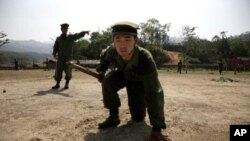Burma’s military-backed government has offered a possible path to peace with ethnic rebel groups who have long fought against central authorities for autonomy. A peace agreement is a key demand of Western nations, including the United States, for improving relations with Burma. Although some people are encouraged by the offer, not all rebel groups are convinced it is genuine.
The government's new peace offer was disclosed Saturday when an envoy of Burmese President Thein Sein discussed the three-part deal with rebel representatives. The offer calls for a cease-fire, followed by development assistance and then a national conference to discuss political grievances.
This is the first time that central government authorities have offered to hold political discussions with the rebel groups. Those who attended the talks say three of the five rebel delegates welcomed the offer.
Khuensai Jaiyen, editor of the Shan Herald Agency for News, was invited to the meeting as an unpaid advisor for the Shan State Army South. He says the Shan, the Karen National Union, and Chin National Front agreed to the offer, in principal.
"They expect it to be sort of like the Panlong conference in 1947, where they can talk about full autonomy in their own internal affairs, human rights and democracy, of course," he said.
The 1947 Panlong conference was launched by democracy leader Aung San Suu Kyi’s father, Aung San, and three ethnic groups to reach independence from Britain.
The Panlong Agreement also resulted in a broad outline for autonomy for the ethnic regions.
But Aung San’s assassination later that year, the government’s failure to implement the spirit of the agreement, and military rule fueled ethnic rebel uprisings.
Since then, those ongoing rebellions have been cited by the Burmese government as the reason for having a strong military. Burma’s army has dominated the country for more than half a century.
David Steinberg, a Burma analyst at Georgetown University in Washington D.C., says the fair distribution of power among ethnic groups is the most serious problem facing the country since independence.
"They’re not doing enough to address that. They’ve rescinded something at least for the moment," he said. "They had this plan for border guard forces, which would integrate the minority armies into the Burma army and basically emasculate them in terms of their ability to revolt against the government. But because of such resistance the new government has shelved that plan."
Despite continued fighting, the nominally civilian government that took office in March, after decades of overt military rule, promised peace talks.
But President Thein Sein, himself a former general, told journalists at a press briefing Saturday that negotiations have been difficult.
He says, because the ethnic minorities have different cultures, different traditions and different goals it is impossible to reach agreement when they hold talks. He says they have tried before and failed. He says they talk with them individually and try to find common ground. He says the talks are based on the principles that the rebels accept not to break away from the union and to accept the major guidelines in the 2008 constitution.
The two rebel groups at the talks that did not agree to the government’s terms are the Karenni National Progressive Party and the Kachin Independence Organization.
The KIO and government troops have been fighting pitched battles this year in northern Kachin State.
La Ja, a spokesman for the group, says they are not yet ready to accept the offer. He says this is just an initial meeting and there is no reason to decide whether to accept the government offers. He says, if the government wants further discussion, they will have the discussion. He says they cannot say anything conclusive at this point because of the whole situation, including the ongoing fighting.
For the three rebel groups that agreed to the plan, Shan advisor Khuensai Jaiyen says one of the main reasons was the government’s engagement with democracy leader Aung San Suu Kyi - who he referred to using the honorific "Daw."
"Daw Aung San Suu Kyi has been working quite closely with the present government, especially with the president," he said. "If Daw Aung San Suu Kyi trusts the present government enough, maybe they can also."
President Thein Sein has held direct talks with Aung San Suu Kyi who is set to re-enter politics after 15 years of house arrest.
Khuensai says, nonetheless, the rebel groups are still cautious. He says they understand there are risks in dealing with the government, but that they are risks worth taking.
Burma Ethnic Rebels Cautious About Government Peace Offer




